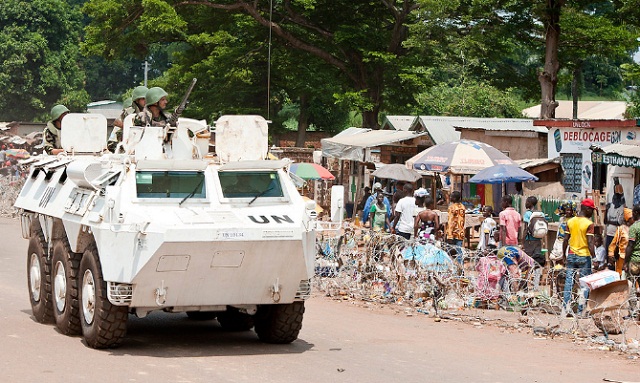
Bangui, Central African Republic | AFP | The pot-holed streets of Bangui’s Muslim quarter are lined with stalls plying their trade to a cacophony of honking horns and cars backfiring — a comforting image of bustling life in Central African Republic’s capital.
But beneath this veneer of normalcy, many traders in the flashpoint district of PK5 are on edge.
Last month, they agreed as one to stop paying protection money demanded by the numerous “self-defence” militias set up to protect the city’s Muslim minority.
Their defiance prompted an angry response from a militia chief known as “Force.” He gave them a week to get in line.
That deadline expired on January 25.
Now the shopkeepers wait nervously for what happens next.
“We’re going to put an end to this extortion, to this racket,” insists a trader called Karim Yahya, one of more than a thousand traders working in this densely-populated neighbourhood.
“It’s become a fallback for all the crooks,” agrees another who is close to the local traders association.
But he does not give his name, fearing that speaking out could cost him his life after he, like many others, was threatened by Force.
Even so, he too has also had enough. “It’s freedom or death,” he declares.
For now, residents are feeling somewhat reassured by the rather unusual sight of armoured vehicles from the UN’s MINUSCA mission rumbling through the narrow red dirt roads of the PK5 neighbourhood.
And it has not gone unnoticed by Force and his men.
“The MINUSCA forces are driving around without any constraints — they just want to influence the local population,” he raged in a phone conversation with AFP.
– ‘Necessary evil’ –
The tale sheds light on the chaos and lawlessness that afflict the CAR, one of the world’s poorest and most insecure countries.
PK5’s population used to be fully behind the armed groups, which sprung from a desire to protect their neighbourhoods as the country spiralled into civil war in 2016.
“We were the ones who set up these groups, because the state wasn’t protecting us,” explains Yahya.
A mainly-Muslim alliance, the Seleka, seized power in Bangui but lasted only 10 months before being forced out. All the Muslims either fled the capital or took refuge in PK5.
Constantly under attack by vigilantes from the anti-balaka militias set up to defend Christians from the balaka machetes used by Seleka rebels, the PK5 Muslims funded the creation of their own self-defence groups.
Most of them were former Seleka rebels.
But as time went on, these self-defence groups have increasingly given way to loosely-organised mafia-style gangs.
And it is to these gangs that traders have been paying a monthly “tax” of between 5,000 and 10,000 CFA francs (up to 15 euros/$20) for the flimsy shacks from which they sell their wares.
And each truck of goods has also been subjected to a variable tax of up to 75 euros.
Until now, the traders just put up with it — “a necessary evil,” as many described it.
But that began to change after months of incessant violence, which climaxed in a football match that spun out of control.
 The Independent Uganda: You get the Truth we Pay the Price
The Independent Uganda: You get the Truth we Pay the Price





